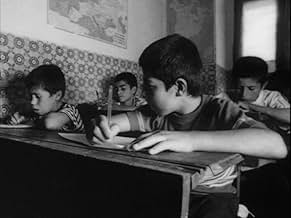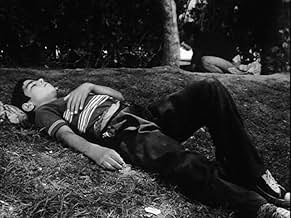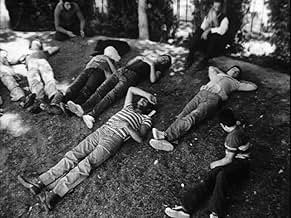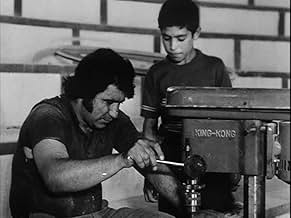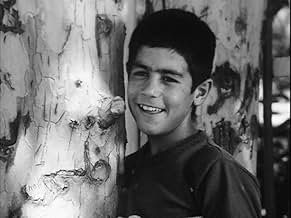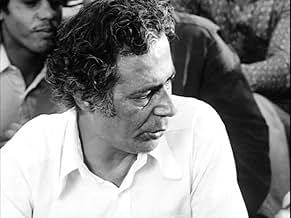Mossafer
- 1974
- 1h 23min
CALIFICACIÓN DE IMDb
7.5/10
2.4 k
TU CALIFICACIÓN
Agrega una trama en tu idiomaA grade-school-age boy, neglected by his parents, lies, cheats, and steals to accumulate enough money to afford a bus ride to a large city and a ticket to see his favorite soccer team play.A grade-school-age boy, neglected by his parents, lies, cheats, and steals to accumulate enough money to afford a bus ride to a large city and a ticket to see his favorite soccer team play.A grade-school-age boy, neglected by his parents, lies, cheats, and steals to accumulate enough money to afford a bus ride to a large city and a ticket to see his favorite soccer team play.
- Dirección
- Guionistas
- Elenco
- Dirección
- Guionistas
- Todo el elenco y el equipo
- Producción, taquilla y más en IMDbPro
Opiniones destacadas
The precursor of WHERE IS THE FRIEND'S HOUSE. Genius, Iran master director, the man who draw the cinema to the fullest, Abbas Kiarostami's first feature film.
If there were a certain form for the moralizing film, and it must be the children-heading-film.
The children in the cinema, according to Bazin, is the most beguiling moral motif. We are expecting this innocent, naive, impeccable face I'm moralized. Like in GERMANY YEAR ZERO, the child's face had no changes between killing his father, committing suicide, and lost of game with his friends. And it is also granted with the actions that may not expected at that ages, it's a sheer experience of reverse social identities.
In THE TRAVELER, the kid, our hero, is the existence of unbounded, struggling in this ruthless system from his own flair, which is the fundamental of the cinema-the struggle between freedom and confinement.
The unexpectedly using of musics is wonderful. The ending shot is beautifully inane. Drives me cry.
Paris Theatre.
If there were a certain form for the moralizing film, and it must be the children-heading-film.
The children in the cinema, according to Bazin, is the most beguiling moral motif. We are expecting this innocent, naive, impeccable face I'm moralized. Like in GERMANY YEAR ZERO, the child's face had no changes between killing his father, committing suicide, and lost of game with his friends. And it is also granted with the actions that may not expected at that ages, it's a sheer experience of reverse social identities.
In THE TRAVELER, the kid, our hero, is the existence of unbounded, struggling in this ruthless system from his own flair, which is the fundamental of the cinema-the struggle between freedom and confinement.
The unexpectedly using of musics is wonderful. The ending shot is beautifully inane. Drives me cry.
Paris Theatre.
Kiarostami's first feature film. If you've seen any of his later children's movies (e.g., Where Is the Friend's Home?), you'll definitely recognize this as from the same filmmaker. I didn't think it was particularly good, though. Hassan Darabi stars as Quassem, a 12 year-old boy who spends his entire life getting in trouble at school or with his nagging mother. He is kind of a bad boy, and pretty much deserves whatever he gets. The story revolves around Quassem trying to get enough money to attend a soccer match in Tehran. It's hard to really like the film because Quassem is such a brat. He inspires little sympathy. Yes, he does get his comeuppance, and that final bit of the film is sort of satisfying, but there's not much to the film otherwise. Most of it consists of Quassem and a friend bilking the people around them for pocket change, with maybe a good quarter of the film consisting of his annoying mother bitching him out about not doing his homework. This is now available from Criterion, on the Close-Up DVD (or at least the Blu Ray).
Mossafer is shot in black and white with non-professional actors (I believe with the exception of one character which is indeed performed by a professional actor).
There are two great strenghts in this film. First, it really knows how to tell a story. It's a story anyone could easily tell in a couple of minutes. Second, it is very realistic, it really transports us to different place in a different time.
The story will appeal to almost everyone who has been a child wanting to do or to have something in spite of the will of parents, teachers or society in general. Luckily for us, the film is economical in the way it tells the story. There are no meaningless scenes or boring long shots as is usual in this kind of author cinema. It is no surprise that the film runs under 90 minutes.
During this eighty something minutes we are taken to the town of Malayer, roughly 400 km southwest of Tehran. The year is unknown, but we are probably in the late 1960s or early 1970s (the film was released in 1974). In Malayer, we get to know many boys whose life seems to revolve around school, home and playing football whenever possible. We also get acquainted with a few adults (parents, teachers, shop owners or passerbys).
One thing that somehow transpires with all these characters is a sense of dignity all these persons possess. No matter if the father punishes the son with his belt (as we are told, although not seen), or if the teachers are brutal and have little interest wether the boys learn or not or even if the main character uses quite unethical and even illegal schemes to pursue his objective of going to Tehran to watch the Iran's national team playing: they all have their legitimate desires and no one can take their dignity away.
All in all, this is a film that resonates and stays with us for many days. I would not call it a masterpiece but it is certainly a very special film.
There are two great strenghts in this film. First, it really knows how to tell a story. It's a story anyone could easily tell in a couple of minutes. Second, it is very realistic, it really transports us to different place in a different time.
The story will appeal to almost everyone who has been a child wanting to do or to have something in spite of the will of parents, teachers or society in general. Luckily for us, the film is economical in the way it tells the story. There are no meaningless scenes or boring long shots as is usual in this kind of author cinema. It is no surprise that the film runs under 90 minutes.
During this eighty something minutes we are taken to the town of Malayer, roughly 400 km southwest of Tehran. The year is unknown, but we are probably in the late 1960s or early 1970s (the film was released in 1974). In Malayer, we get to know many boys whose life seems to revolve around school, home and playing football whenever possible. We also get acquainted with a few adults (parents, teachers, shop owners or passerbys).
One thing that somehow transpires with all these characters is a sense of dignity all these persons possess. No matter if the father punishes the son with his belt (as we are told, although not seen), or if the teachers are brutal and have little interest wether the boys learn or not or even if the main character uses quite unethical and even illegal schemes to pursue his objective of going to Tehran to watch the Iran's national team playing: they all have their legitimate desires and no one can take their dignity away.
All in all, this is a film that resonates and stays with us for many days. I would not call it a masterpiece but it is certainly a very special film.
The Traveler (Abbas Kiarostami, 1974) Filmspotting had a positive review of the Kiarostami film Close-Up, so I thought I'd give it a go as my knowledge of Iranian films is very slight. When I got it via Netflix, I discovered there was a separate feature on the DVD (I love when that happens!) so on a whim I tried the extra out first.
The Traveler is good enough to have warranted its own DVD release, although I'm glad it was included on Close-Up. Kiarostami later referred to it as his first picture, and it's about as good a one as I've seen (short of something like Citizen Kane maybe). The main character is a young boy who will do whatever it takes (including steal and scam) to be able to afford to go to a soccer match in Tehran. I couldn't help but laugh at some of the stunts he pulled, even knowing that if he was my kid I'd have been appalled.
The director manages in The Traveler to make the boy a sympathetic character even after you see what he does: for all his questionable behavior (and who at that age doesn't exhibit questionable behavior at some point?) I relate to his loneliness and sadness, and even some of his obsessiveness in pursuing what he wants. The film reminds me of The 400 Blows (as I'm sure it's supposed to) but in some ways it is actually more successful than that Truffaut film in balancing humor with pathos. The final five minutes in particular are terrific.
If this is considered a minor work by Kiarostami, then he could well be added to my list of favorite directors soon. 8/10
The Traveler is good enough to have warranted its own DVD release, although I'm glad it was included on Close-Up. Kiarostami later referred to it as his first picture, and it's about as good a one as I've seen (short of something like Citizen Kane maybe). The main character is a young boy who will do whatever it takes (including steal and scam) to be able to afford to go to a soccer match in Tehran. I couldn't help but laugh at some of the stunts he pulled, even knowing that if he was my kid I'd have been appalled.
The director manages in The Traveler to make the boy a sympathetic character even after you see what he does: for all his questionable behavior (and who at that age doesn't exhibit questionable behavior at some point?) I relate to his loneliness and sadness, and even some of his obsessiveness in pursuing what he wants. The film reminds me of The 400 Blows (as I'm sure it's supposed to) but in some ways it is actually more successful than that Truffaut film in balancing humor with pathos. The final five minutes in particular are terrific.
If this is considered a minor work by Kiarostami, then he could well be added to my list of favorite directors soon. 8/10
Kiarostami's first feature (made some 15 years before he became the darling of the film festival circuit) tells the story of a troublesome, amoral 10 year old boy (Hassan Darabi), living in a small town in Iran, who wishes to go to Tehran to see Iran's national football team play an important match. To achieve that, he steals money from friends and neighbors through a series of scams. After a number of adventures, he finally reaches Tehran stadium at the time of the match, but there, and without giving totally away the ending, he ends up getting some sort of comeuppance (as usual by Kiarostami, there is a great final shot). One of the remarkable things of the movie is how driven is the boy in reaching his objective, never thinking how what he is doing will affect other people, even those that are closer to him. Also fascinating is the film look at Iranian football culture during the 70s (which wasn't very different to football culture in other countries at the time). Kiarostami has a very fine hand in telling a story sensitively, and he avoids the pretentiousness he showed in later films, after he has been acclaimed by European critics.
¿Sabías que…?
- TriviaThis film is featured as a bonus on "Close-Up", released by the Criterion Collection, spine #519.
- ConexionesFollowed by Safari be Diare Mosafer (1993)
Selecciones populares
Inicia sesión para calificar y agrega a la lista de videos para obtener recomendaciones personalizadas
- How long is The Traveler?Con tecnología de Alexa
Detalles
- Tiempo de ejecución
- 1h 23min(83 min)
- Color
- Mezcla de sonido
- Relación de aspecto
- 1.37 : 1
Contribuir a esta página
Sugiere una edición o agrega el contenido que falta

